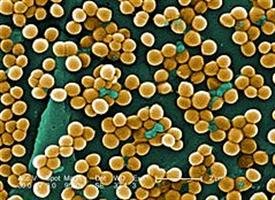Industry Scientists to Discuss Drug Discovery Challenges, Successes
Industry Scientists to Discuss Drug Discovery Challenges, Successes
January 11, 2011

Scanning electron micrograph of MRSA, a crucial drug target.
Several industry scientists who have been instrumental in discovering new drugs and vaccines will visit the Medical Center this semester as part of a new course on drug discovery. The class is being offered through the Department of Microbiology and Immunology and has a special focus on antibiotics and vaccines.
The first visitor will be Steven Projan, Ph.D., senior vice president of MedImmune, who played an important role in the development of Tygacil®, a drug to treat methicillin-resistant Staphylococcus aureus or MRSA.
Presenters will discuss their own experiences in drug development, the surprises and rewards along the way, and the goals and topics currently at the forefront of the field. Besides presenting to the class, visitors will give presentations open to the broader University community and will be available to discuss possible collaborations.
“A course of this type is really quite rare,” said Paul Dunman, Ph.D., associate professor of Microbiology and Immunology and course director. “At a recent conference, several scientists in industry said they would give preferential treatment to job candidates with a course like this listed on their CV. Several industrial scientists in drug discovery have volunteered to participate in our course, often on their own dime, because they are so excited and see it as that important.”
Projan will speak at the first meeting of the course Friday, Jan. 21. He will also give a public lecture about drug discovery research at 1 p.m. that day in Room K207 (Room 2-6408) and will be available at a reception at 3:30 p.m. in Room 2-11211.
Additional visits this semester will come from officials with Pfizer, Johnson & Johnson, Regeneron, and other companies. Many have had a direct hand in creating vaccines or medications widely used today, such as the Prevnar vaccine, which prevents maladies such as meningitis and ear infections. Lectures will also be given by leading URMC researchers, such as Robert Rose, Ph.D., who have expertise in the development of new vaccines or antimicrobial drugs.
“Our faculty created the class because we felt it was important for our students to learn more about translating the findings from the laboratory to a point where they have implications in the real world. What better way for our students to learn about that than to hear directly from internationally recognized leaders in drug discovery?” added Dunman, who worked in antibiotic drug discovery at Wyeth Pharmaceuticals before joining the University in September.
The course comes at a time when drug discovery is increasingly an emphasis among researchers at the University. Additional resources include:
>> The University’s Virtual Drug Discovery Center, which aims to accelerate research by investigators who are working on new drug discovery. The center is designed to provide the infrastructure crucial to exploration and creation of new drugs, such as facilitating access to new technologies, helping scientists navigate issues related to funding and intellectual property, and connecting researchers with colleagues facing similar challenges. Scientists at the University are actively investigating new drug targets for a range of diseases, including muscular dystrophy, severe infections, cancer, heart disease, HIV, and Alzheimer’s disease. The lead contact for the center, which was created last year, is Michael Rusnak of the Office of Technology Transfer.
>> The High Throughput Screening Core, which provides University investigators with relatively low-cost access to screening chemical libraries for identification of novel molecules for experiments. Convenient access to such sophisticated technologies is vital for investigators searching for compounds that have the ideal properties for experiments necessary to find or create new drugs. For many researchers, combing through databases of tens or hundreds of thousands of compounds is just one step in the long effort to offer a new drug to treat disease, and the core is designed to simplify the process as much as possible. The core is headed by Alan Smrcka, Ph.D., professor of Pharmacology and Physiology.
The new class is open to graduate students and senior-level undergraduates with an interest in microbiology and drug discovery. Anyone who would like more information should contact Dunman at Paul_Dunman@urmc.rochester.edu

* The above story is reprinted from materials provided by University of Rochester Medical Center
















